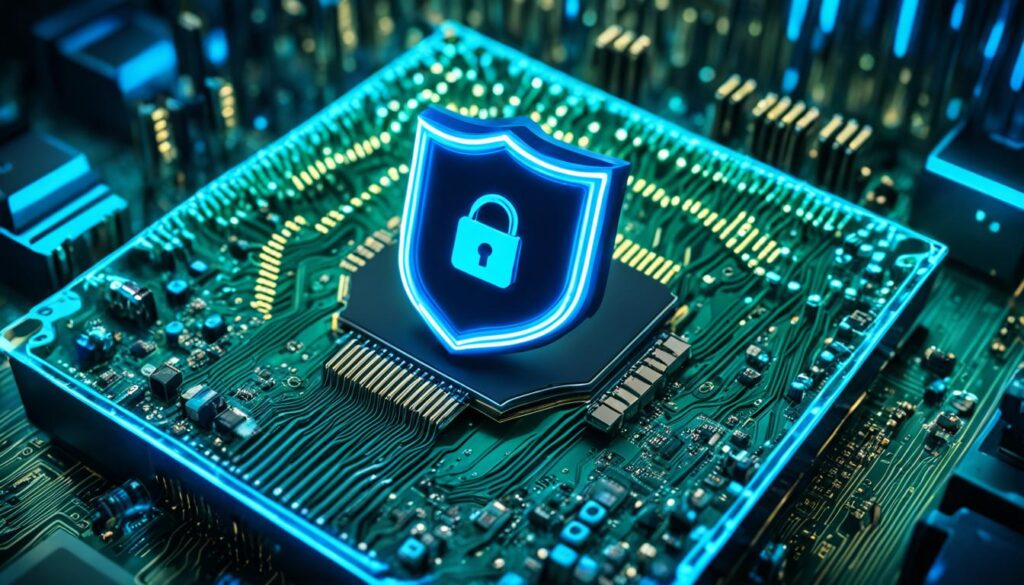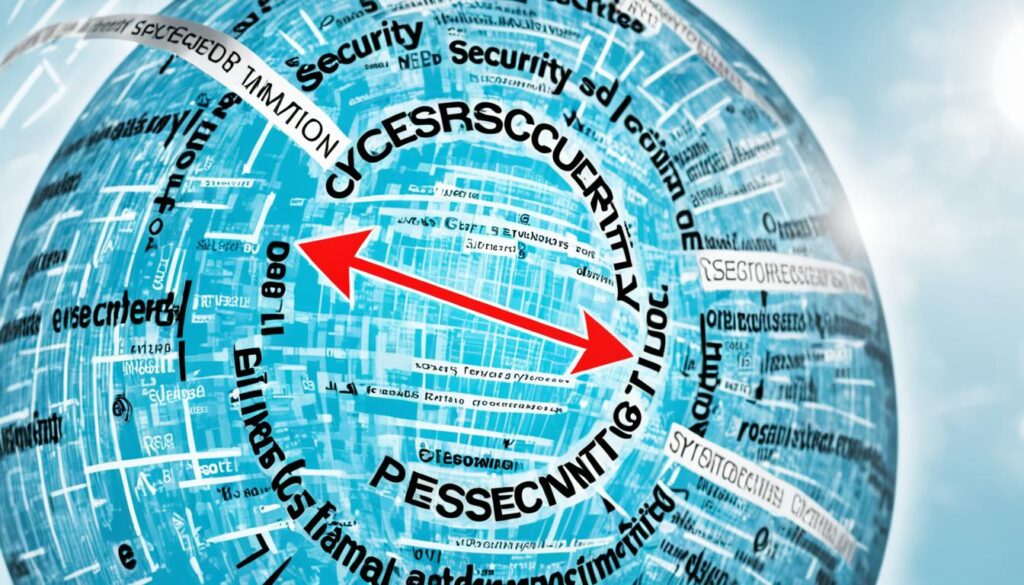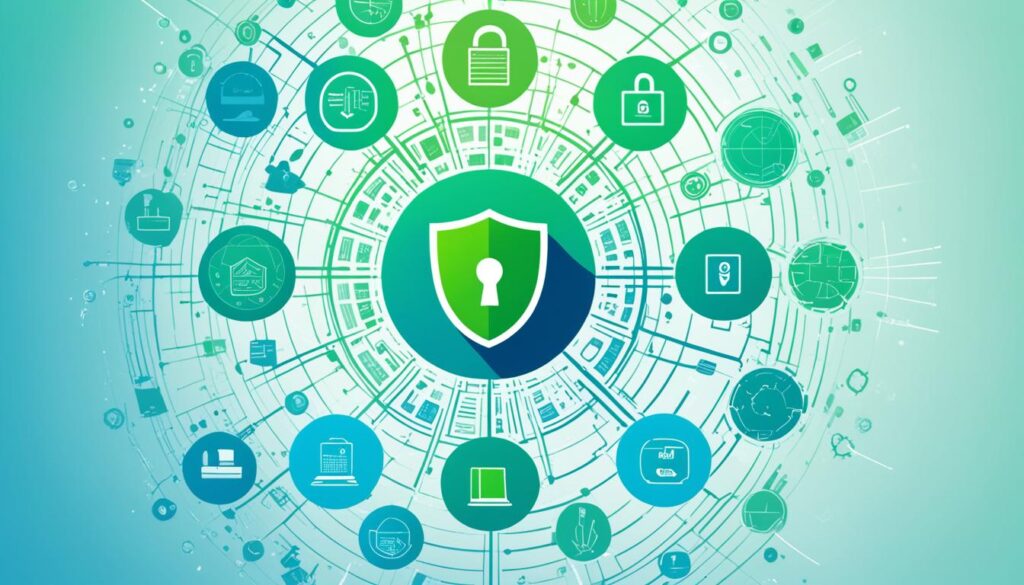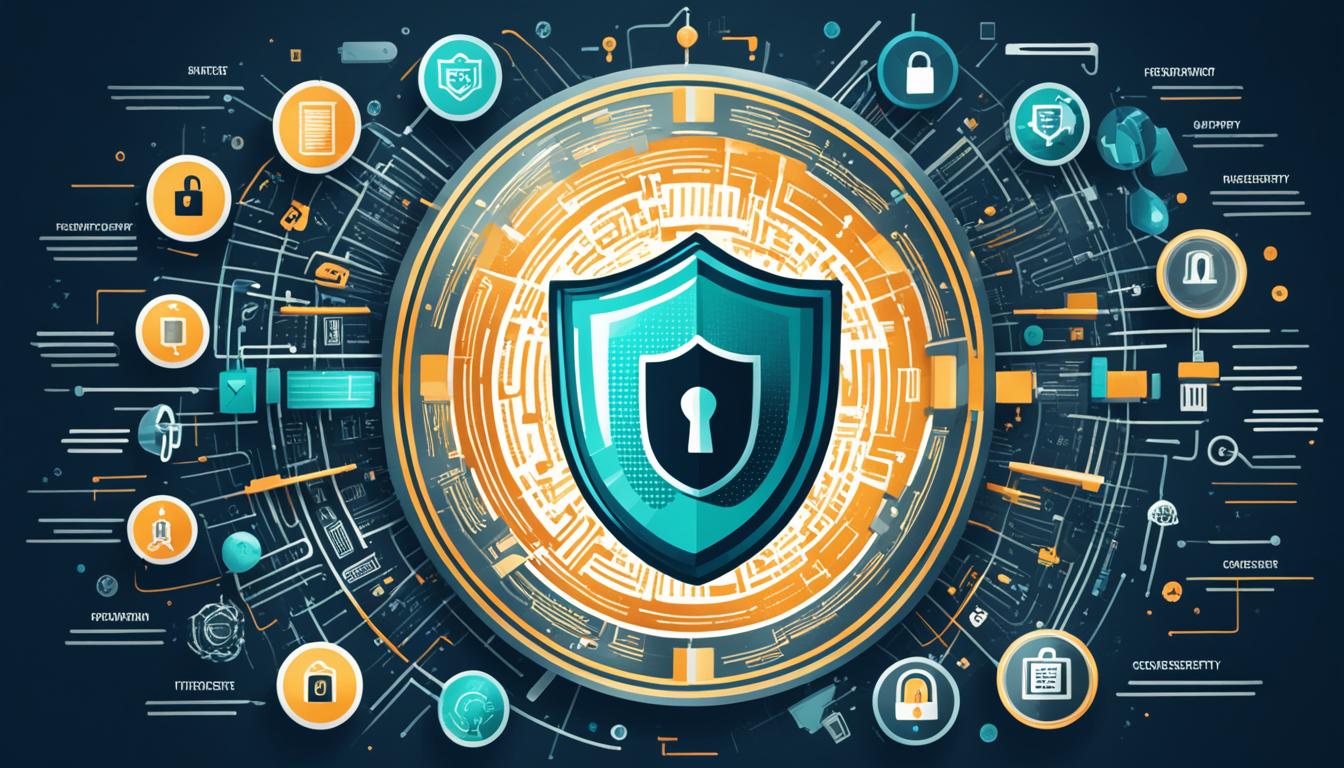Did you know only 7.12% of colleges are top in cybersecurity and information security? This is out of 6,290 schools looked at1. Now, more businesses use computer systems, so they focus on keeping data safe with cybersecurity and information security2.
Cybersecurity and information security are often mixed up, but they’re not the same. Cybersecurity protects devices from cyber threats. Information security keeps all kinds of information safe, both in person and online2.
In the last ten years, how we store data has changed a lot. Now, we use cloud services like AWS S3 and laptops more than old filing cabinets2. This means we need more cybersecurity to keep data safe online. And we also need information security to protect it in real life2.
Businesses use computers more and more, so info security and cybersecurity are working together more. It’s important to know which data is most valuable to protect it well2.
Key Takeaways
- Information security and cybersecurity are different but work together to keep data and systems safe.
- Cybersecurity mainly deals with keeping electronic data safe from threats. Information security covers both digital and real-world data protection.
- Storing data in the cloud and on laptops has made cybersecurity experts more needed.
- As companies use computers more, info security and cybersecurity are joining forces to fight data breaches.
- It’s key to focus on protecting data based on its value for good risk management.
Understanding Information Security
Infosec is all about keeping sensitive data safe from bad guys. It’s super important in our digital world. People spent over $71 billion on IT security last year3.
Defining Information Security
Infosec keeps data safe by protecting its secrecy, making sure it’s not changed, and keeping it ready for use4. It covers not just computers, but also paper stuff and secrets. Experts make rules and controls to keep data safe from harm.
The CIA Triad Model
The CIA triad is key to infosec. It talks about three main things: keeping data secret, making sure it’s correct, and keeping it available4. It helps keep data safe from wrong hands, changes, and being lost.
Protecting Physical and Digital Data
Infosec protects both digital and real-world data. It’s not just about keeping computers safe. Things like locks, cameras, and safe places help keep real data safe4. This way, infosec covers all bases to keep data safe.
With more phishing and ransomware attacks, infosec pros are in high demand3. Companies big and small are spending a lot on keeping data safe. By knowing how to protect data, we can beat threats and keep our stuff safe.
Exploring Cybersecurity
In today’s world, digital data is very important for businesses. They need strong cybersecurity to keep it safe from cyber threats. Cybersecurity keeps electronic systems and information safe from hackers and damage5.

Cybersecurity Defined
Cybersecurity is about keeping digital data safe. It uses strategies and tech to protect against cyber threats. The main goal is to keep information safe and only let the right people see it5.
More people are needed in cybersecurity as threats get worse. The U.S. Bureau of Labor Statistics says jobs for information security analysts will grow by 32% from 2022 to 20326. This is because hackers are getting better at finding ways into systems.
Focusing on Electronic Systems and Communications
Cybersecurity experts work to keep all electronic systems safe. They protect things like power grids and online services5. Most data breaches happen because of attacks on people, like phishing7.
Cybersecurity has many areas, each dealing with different threats:
- Network security: Keeps networks safe and encrypts data7
- Cloud security: Protects data in the cloud from unauthorized access7
- Application security: Makes software safe from start to finish
- Endpoint security: Keeps devices safe from malware and threats
As we use more digital tech, cybersecurity is more important. Companies need to invest in good cybersecurity and hire skilled people. Cybersecurity jobs pay well, with an average salary of about $120,3606.
Information Security vs Cybersecurity
Protecting data and systems is important. You might ask what’s the difference between information security and cyber security. These terms are often used together but have some differences.

Key Distinctions Between the Two Fields
Information security covers all ways to protect data, whether it’s on a computer, in a safe, or in someone’s head. It makes sure data stays secret, whole, and easy to get to. People in this field make rules and plans to keep data safe from threats.
Cyber security is about keeping electronic systems and data safe from hackers and other online dangers. It stops and fights off cyber attacks like viruses and phishing. Cyber security experts keep computers and networks safe from bad people and make sure they work well.
Did you know 85% of data breaches come from phishing and tricking people8? This shows how important good cyber security is. With more businesses going digital, the need for cyber security experts is growing fast.
Cybersecurity as a Subset of Information Security
Cyber security is a big part of information security, but it’s not all of it. Information security looks at all ways to keep data safe, not just online threats. It uses things like locks, cameras, and training to protect data.
Cyber security focuses on keeping computer systems and data safe online. It uses things like secret codes and firewalls to stop hackers. Cyber security experts work hard to keep data safe and make sure it’s available when needed.
There’s a big need for people good at information security and cyber security. They get paid well too. In the U.S., people who work in information security make about $102,600 a year9. Those who manage computer systems make even more, about $159,0109. This shows how important it is to protect information and the good jobs in these fields.
In the end, information security and cyber security are related but different. Information security protects all kinds of information, while cyber security focuses on digital systems and data. Knowing the difference helps companies protect their important information from threats.
Overlap Between Information Security and Cybersecurity
Information security and cybersecurity are not the same but they work together a lot. They use the CIA triad to keep data safe10. This means data stays secret, is not changed, and is only for those who should see it.

Shared Security Practices
Both fields use similar ways to keep data and systems safe. These ways include:
- Risk assessment and management
- Vulnerability scanning and penetration testing
- Incident response and disaster recovery planning
- Employee training and awareness programs
- Compliance with industry standards and regulations
Using these shared ways, companies can keep their stuff safe from threats. As companies use more computers, the jobs of info security and cybersecurity pros get closer together10.
Similar Education and Skill Requirements
To work in info security or cybersecurity, you usually need a degree in a tech field10. Companies want people who know a lot about keeping things safe.
People in these jobs need to know about many things. This includes how to use software, find threats, and fix problems10. These skills help them keep an eye on systems and deal with issues fast.
| Degree | Information Security | Cybersecurity |
|---|---|---|
| Bachelor’s | Required | Required |
| Master’s | Preferred for advancement | Preferred for advancement |
| Doctoral | Required for research and teaching positions | Required for research and teaching positions |
Getting certifications like CompTIA Security+ is also important3. It helps people start or move up in their careers. Keeping up with new tech and threats is key in these jobs.
More people want to work in info security and cybersecurity. So, schools and training programs are growing to meet this need1.
As info security and cybersecurity get closer, workers need to keep learning and growing. Knowing about cyber security and computer science helps them keep data safe from new threats.
Careers in Information Security
The field of information security has many exciting and rewarding jobs. More companies use digital systems and data, so they need people who can keep these safe. Jobs for information security analysts, like Cyber Security Specialists and Information Security Officers, will grow by 31 percent from 2019 to 202911. Let’s look at some important jobs in this field.

Information Security Analyst
As an information security analyst, you plan, set up, update, and check security to keep computer networks and information safe. This job is like being a cybersecurity analyst, focusing on keeping an organization’s systems and data secure. You’ll need a bachelor’s degree in computer science, information technology, or a similar field. You might also need certifications like CISSP or CEH11.
Information Security Specialist
Information security specialists are key in making and following plans to manage risks to information. They work with a team to keep an organization’s data safe and sound10. This job needs skills in solving problems, paying attention to details, and talking to people who don’t know much about tech. You’ll need a bachelor’s degree in a tech field and might need certifications like CISSP or CISM11.
IT Security Consultant
IT security consultants use their knowledge to help organizations get better at keeping their information safe. They work on things like making data privacy better, managing who can access information, and fighting cyber threats. This job needs a good understanding of the latest security practices, analytical skills, and the ability to keep up with new threats. Consultants work with all kinds of companies, helping them protect against cyber attacks.
| Role | Typical Education | Key Responsibilities |
|---|---|---|
| Information Security Analyst | Bachelor’s degree in computer science, information technology, or related fields | Planning, implementing, and monitoring security measures to protect networks and data |
| Information Security Specialist | Bachelor’s degree in information technology, computer science, or related fields | Developing and implementing information risk management frameworks, standards, and policies |
| IT Security Consultant | Bachelor’s degree in a related field and extensive infosec experience | Assessing and recommending improvements to an organization’s information security posture |
Companies looking for cybersecurity and information security jobs want degrees in fields like information security or computer science10. They look for skills like thinking critically, solving problems, and working well with others10. With the right education, skills, and love for keeping digital assets safe, you can have a great career in information security.
Cybersecurity Career Paths
The need for skilled cybersecurity pros is growing fast. Two key jobs are cybersecurity analysts and cybersecurity engineers. They keep organizations safe from online threats.

Cybersecurity analysts watch over an organization’s data. They look for and stop cyber threats. They make sure data stays safe and private12. They earn about $98,497 a year on average13. The job is expected to grow by 35% from 2021 to 203114.
Cybersecurity engineers do more. They make and keep security systems strong. They design firewalls and check for weak spots12. They make about $114,898 a year13.
To be a cybersecurity engineer, you usually need a degree in computer science or a related field. Or, you can learn through cybersecurity bootcamps.
Here’s a table showing average salaries for different jobs in cybersecurity13:
| Position | Average Annual Salary |
|---|---|
| Cybersecurity Manager | $160,020 |
| Ethical Hacker | $133,458 |
| Security Architect | $211,207 |
| Chief Information Security Officer | $301,873 |
When starting your cybersecurity career, keep up with new trends and learn more. Getting certifications like CompTIA Security+ can help your career.
Technology is changing fast, and cyber threats are getting more complex. This means there will always be a need for skilled cybersecurity workers. The job for information security analysts is expected to grow by 32% from 2022 to 203212. This shows how great the career opportunities are in cybersecurity.
- Earn a bachelor’s degree or complete a cybersecurity bootcamp
- Gain practical experience through internships or entry-level positions
- Obtain relevant certifications to showcase your expertise
- Stay updated with the latest cybersecurity trends and technologies
- Advance your career by taking on leadership roles or specializing in a specific domain
By following these steps and always learning, you can have a rewarding career in cybersecurity.
Conclusion
In today’s world, keeping data safe is very important for both businesses and people. It’s key to know the difference between information security and cybersecurity. Information security is about keeping data safe, whether it’s in a file or on a computer15. Cybersecurity is about keeping electronic systems safe from bad attacks and unauthorized access15.
Cyberattacks are happening more often and getting more complex. In 2021, one happened every 11 seconds16. Companies need strong cybersecurity to avoid big losses. A data breach can cost a lot, up to $4.35 million in 202216. If a company doesn’t protect data, 81% of customers might leave16.
What a company needs depends on its work and the data it has15. With more businesses going digital, the need for cybersecurity experts will grow a lot. Getting educated in these areas can lead to many jobs, like security analyst or ethical hacker. Staying up-to-date with new threats and ways to fight them is key to keeping data safe.
FAQ
What is the difference between information security and cybersecurity?
What is the CIA triad model?
What types of careers are available in information security?
What are the requirements for a career in cybersecurity?
How do information security and cybersecurity professionals protect sensitive information?
Is there a high demand for information security and cybersecurity professionals?
Source Links
- Information Security Vs. Cybersecurity: What’s The Difference? – https://www.forbes.com/advisor/education/it-and-tech/information-security-vs-cybersecurity/
- Cybersecurity Vs. Information Security: What’s the Difference? | UpGuard – https://www.upguard.com/blog/cyber-security-information-security
- Information Security vs. Cybersecurity: What’s the Difference? – https://online.utulsa.edu/blog/information-security-vs-cybersecurity/
- Is There A Difference? (Yeah) – https://www.bitsight.com/blog/cybersecurity-vs-information-security
- Difference between Cyber Security and Information Security – GeeksforGeeks – https://www.geeksforgeeks.org/difference-between-cyber-security-and-information-security/
- IT vs. Cyber Security Degree: What’s the Difference? – https://und.edu/blog/it-vs-cyber-security.html
- Cyber Security vs. Information Security | Simplilearn – https://www.simplilearn.com/information-security-vs-cyber-security-article
- Information vs Network vs Cybersecurity – https://www.secureworks.com/blog/cybersecurity-vs-network-security-vs-information-security
- Differences in Information Security vs. Cybersecurity – https://www.gcu.edu/blog/engineering-technology/differences-information-security-vs-cybersecurity
- Information Security vs. Cybersecurity: Understand the Differences – https://online.champlain.edu/blog/information-security-vs-cybersecurity
- Cyber Security Specialist vs. Information Security Officer – https://infosec-jobs.com/insights/cyber-security-specialist-vs-information-security-officer/
- Careers In Cybersecurity: Which One Is Right For You? – https://www.forbes.com/advisor/education/it-and-tech/careers-in-cybersecurity/
- 5 Cybersecurity Career Paths (and How to Get Started) – https://www.coursera.org/articles/cybersecurity-career-paths
- IT vs Cybersecurity Jobs | Similarities and Differences – https://www.cyberdegrees.org/resources/cybersecurity-jobs-vs-information-technology-jobs/
- Information Security vs Cyber Security: Understanding the Differences | Institute of Data – https://www.institutedata.com/blog/information-security-vs-cyber-security/
- Is Information Security a Subset of Cybersecurity? – https://www.impactmybiz.com/blog/is-information-security-a-subset-of-cybersecurity/

12 thoughts on “Information Security vs Cybersecurity: Key Differences”